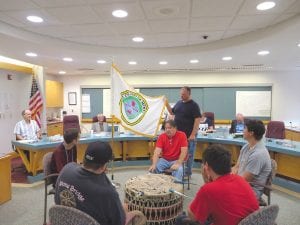New Cook County Commissioner Bobby Deschampe presented the Grand Portage Band of Lake Superior Chippewa flag to the county at the commissioners’ Tuesday, July 18 meeting. Highlighting the presentation were two songs played and sung by the Grand Portage Stone Bridge Singers drum group. The flag was a gift from the band and will now be displayed in the commissioners’ room next to the U.S. flag.

Telling the board it was long overdue, new District One Cook County Commissioner Bobby Deschampe opened the July 18 meeting by presenting the county board with a flag from the Grand Portage Band of Lake Superior Chippewa.
The flag was placed behind Deschampe’s chair and will be a permanent addition to the commissioners’ room.
On hand were the Stone Bridge Singers drum group from Grand Portage who performed the traditional Flag and Honor Songs.
“It is an honor to add the Grand Portage flag to the county courthouse,” said Deschampe. “This is something that is long overdue and recognizes the cultural significance and contributions of the Grand Portage Band to Cook County.”
Valerie Marasco, Cook County Emergency Management, and Public Information director presented an All Hazard Mitigation Plan (AHMP) application to the county board. Once completed, the application must be submitted to Minnesota Homeland Security & Emergency Management.
The county’s last board and Federal Emergency Management Agency (FEMA) approved AHMP was adopted in 2010. It was updated in 2015.
Marasco said minimal work was done to revise the plan from 2015-2016. The county needs to reapply to start under the new program, she said. The University of Minnesota Duluth’s Geospatial Analysis Center and their Hazard Mitigation Planning Team will be hired to work with the Cook County Office of Emergency Management and Public Information on the plan update. Some public involvement will also be sought in making the new plan.
The cost to write the grant application is $28,000 with Cook County paying 25 percent—or $7,000—of that cost. The $7,000 will be taken from the Emergency Management budget left over from 2015, Marasco said.
Potential disasters include natural and human-made. Marasco said Cook County’s biggest concerns tend to be with wildfire and straight-line winds that blow down trees.
The City of Grand Marais, Grand Portage Reservation, Hovland, Croftville, Colvill, Gunflint Trail, Maple Hill, Lutsen, Tofte, Schroeder, and unorganized territories are covered in the AHMP.
Lutsen housing project
Scott Harrison, EDA treasurer and Mary Somnis, EDA director, gave the status of the 16-unit workforce housing project that was going to be built in Lutsen this fall.
Plans have been pushed back to next spring or early summer, said Harrison, who cited four reasons for the delay.
Cliff Knettel, deputy director of One Roof Community Housing, who will own and manage the development, said housing costs from Dynamic Homes came in higher than expected even after attempts to redesign the units and eliminate certain elements were done. Knettel said One Roof was now looking at other builders for estimates.
To offset potentially higher building costs, Harrison said the EDA had approached the Iron Range Resources Rehabilitation Board (IRRRB) for an additional $200,000 and the Minnesota Department of Employment and Economic Development (DEED) for an additional $100,000.
To date, IRRRB has promised $350,000.
Another source of financing might come from a deferred loan from the Greater Minnesota Housing Fund, said Harrison, but they haven’t committed any funds yet.
Altogether, these three sources total $380,000, but, “We just do not feel that we can take the risk by assuming we will be 100 percent successful.”
DEED, said Harrison, was supportive of the request, but also requires a supplemental application for IRRRB funds. Because the city of Glencoe had left over money from a DEED housing grant, those funds might well be distributed to the Lutsen housing project, Harrison said. Just how much that will be is undetermined at this time because Minnesota Department of Transportation informed the city of Glencoe that it needed to install a turn lane at the housing development. Until that work is finished, the additional amount of money that could go to Lutsen housing won’t be known.
In the meantime, the sale of pre-paid tax abatement bonds scheduled for July 17 was postponed until a later date. Harrison said the extra time would allow for wetland mitigation and an archeological review of the property as required by the Army Corps of Engineers.
“Our goal is to finalize these remaining funding sources over the next two months, and our hope is that Cook County would issue bonds in May of 2018 so that funds were available for construction in June. We will explore the possibility of doing some site work yet this fall,” said Harrison.
Harrison added Cook County/Grand Marais EDA was keenly aware there were risks to delaying the project. “We could see changes in interest rates and building materials and labor costs. The bids we have received for the housing units, and subcontractors are also subject to change over the next nine months.”
Because the presentation contained information only, the county board took no action.
In other board action commissioners approved a new on-sale Sunday sales liquor license application by Cascade Hospitality, LLC, (Cascade Lodge & Restaurant) subject to liability insurance, worker’s compensation compliance and the county attorney and county sheriff approval.
To be eligible for disaster relief funding for human and non-human related disasters, counties must have regularly updated state- and FEMA-approved AHMPs.


Leave a Reply